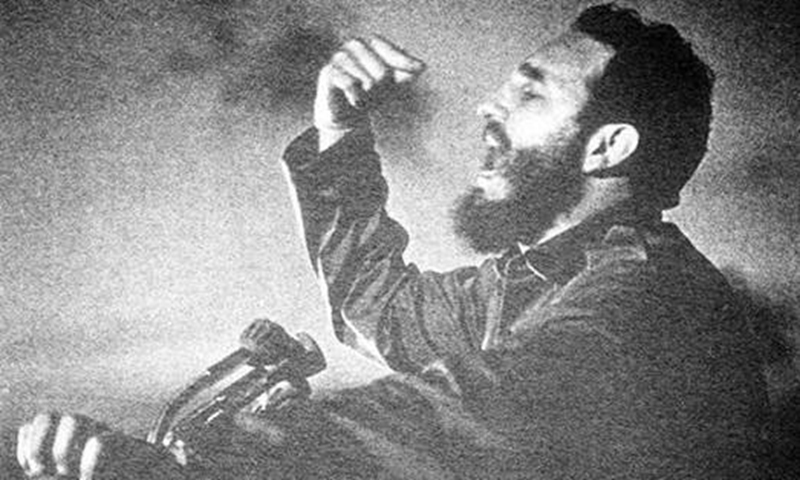Six decades ago, the Cuban people, under the leadership of Fidel Castro and with heroic struggles, overthrew the reactionary dictatorship and won the victory of the revolution. The Chinese people, having had similar experiences, shared the joy and expressed solidary and support to the Cuban people in various ways. Amid the amity between the two peoples, Raúl Castro, one of the leaders of the Cuban revolution, suggested in July 1959 for China to send important cadres to lead the branch of the Xinhua News Agency in Cuba. He hoped that the branch would serve as an unofficial office representing the Chinese government so that the two countries could establish diplomatic relations when conditions were ripe. His proposal was deeply valued by the Chinese side, which sent Zeng Tao, then Secretary-General of the Shanghai municipal government, to head the branch of the Xinhua News Agency in Havana.
Though the revolution was a success, Cuba was yet to enjoy full tranquility. It faced huge external pressure, particularly from its "close neighbor," the United States. On 28 August 1960, at the Seventh Meeting of Consultation of Ministers of Foreign Affairs of American States, the United States manipulated the adoption of the Declaration of San Jose, which attacked the Cuban revolution and interfered in Cuba's internal affairs. This aroused strong indignation among the Cuban people.
On 2 September 1960, the National General Assembly of the People was convened in Havana, participated by more than a million Cuban people. Fidel Castro delivered a speech, in which he expressed the Cuban people's determination to risk their lives for national independence and sovereignty and carry on the cause of revolution. He refuted the defamation in the Declaration of San Jose against the former Soviet Union and China, and expressed appreciation for the selfless assistance from China and other countries to Cuba.

Since its founding on 1 October 1949, the People's Republic of China has sought to establish diplomatic relations with Latin American and Caribbean countries. It was due to the obstruction by the United States that the official channel for establishing diplomatic ties did not always operate smoothly. Against such backdrop, Premier Zhou Enlai proposed the basic guideline of conducting diplomacy at people-to-people level. Witnessed by a million people, such efforts finally paid off in the Revolution Square in Havana. The establishment of diplomatic relations between China and Cuba was like a little spark that would start a prairie fire on this land of passion, opening up new vistas for the friendship between China and the Latin American and Caribbean region. Through 20 years of efforts, Chile, Peru, Mexico and Argentina established diplomatic relations with China, bringing a new wave of establishing diplomatic ties with China in this region.
Though the revolution was a success, Cuba was yet to enjoy full tranquility. It faced huge external pressure, particularly from its "close neighbor," the United States. On 28 August 1960, at the Seventh Meeting of Consultation of Ministers of Foreign Affairs of American States, the United States manipulated the adoption of the Declaration of San Jose, which attacked the Cuban revolution and interfered in Cuba's internal affairs. This aroused strong indignation among the Cuban people.
On 2 September 1960, the National General Assembly of the People was convened in Havana, participated by more than a million Cuban people. Fidel Castro delivered a speech, in which he expressed the Cuban people's determination to risk their lives for national independence and sovereignty and carry on the cause of revolution. He refuted the defamation in the Declaration of San Jose against the former Soviet Union and China, and expressed appreciation for the selfless assistance from China and other countries to Cuba.

Fidel Castro raising his arm and announcing the establishment of diplomatic relations between China and Cuba
In a resounding voice, Fidel Castro said to the assembly that the Revolutionary Government of Cuba would like to ask the Cuban people to consider if they would agree to establish diplomatic relations with the People's Republic of China. About a million participants raised their hands, shouting "Yes! Yes!" Fidel Castro told them that the Chinese representative was already among them. He went to the front row, where Zeng Tao, chief of the branch of the Xinhua News Agency in Havana, was seated. He held high Zeng Tao's hand and declared that from that moment on, Cuba had severed its "diplomatic relations" with Chiang Kai-shek's puppet regime. Thunderous applause burst in the square, and people were chanting "China! China!" The Assembly adopted the well-known Havana Declaration of 1960. On 8 September 1960, China designated Zeng Tao as the representative of the Chinese government to consult with the Cuban government on establishing diplomatic relations between the two countries. The two sides soon reached an agreement. On September 28, the joint communiqué on the establishment of diplomatic ties was ratified by both governments, making Cuba the first Latin American and Caribbean country to enter into diplomatic relations with New China.Since its founding on 1 October 1949, the People's Republic of China has sought to establish diplomatic relations with Latin American and Caribbean countries. It was due to the obstruction by the United States that the official channel for establishing diplomatic ties did not always operate smoothly. Against such backdrop, Premier Zhou Enlai proposed the basic guideline of conducting diplomacy at people-to-people level. Witnessed by a million people, such efforts finally paid off in the Revolution Square in Havana. The establishment of diplomatic relations between China and Cuba was like a little spark that would start a prairie fire on this land of passion, opening up new vistas for the friendship between China and the Latin American and Caribbean region. Through 20 years of efforts, Chile, Peru, Mexico and Argentina established diplomatic relations with China, bringing a new wave of establishing diplomatic ties with China in this region.
